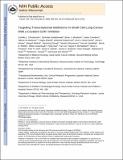Targeting Transcriptional Addictions in Small Cell Lung Cancer with a Covalent CDK7 Inhibitor
Author(s)
Christensen, Camilla L.; Carretero, Julian; Al-Shahrour, Fatima; Zhang, Tinghu; Chipumuro, Edmond; Herter-Sprie, Grit S.; Akbay, Esra A.; Altabef, Abigail; Zhang, Jianming; Shimamura, Takeshi; Capelletti, Marzia; Reibel, Jakob B.; Cavanaugh, Jillian D.; Gao, Peng; Liu, Yan; Michaelsen, Signe R.; Poulsen, Hans S.; Aref, Amir R.; Barbie, David A.; Bradner, James E.; George, Rani E.; Gray, Nathanael S.; Wong, Kwok-Kin; Kwiatkowski, Nick; Abraham, Brian Joseph; Young, Richard A.; ... Show more Show less
DownloadYoung_Targeting transcriptional.pdf (1.663Mb)
PUBLISHER_CC
Publisher with Creative Commons License
Creative Commons Attribution
Terms of use
Metadata
Show full item recordAbstract
Small cell lung cancer (SCLC) is an aggressive disease with high mortality, and the identification of effective pharmacological strategies to target SCLC biology represents an urgent need. Using a high-throughput cellular screen of a diverse chemical library, we observe that SCLC is sensitive to transcription-targeting drugs, in particular to THZ1, a recently identified covalent inhibitor of cyclin-dependent kinase 7. We find that expression of super-enhancer-associated transcription factor genes, including MYC family proto-oncogenes and neuroendocrine lineage-specific factors, is highly vulnerability to THZ1 treatment. We propose that downregulation of these transcription factors contributes, in part, to SCLC sensitivity to transcriptional inhibitors and that THZ1 represents a prototype drug for tailored SCLC therapy.
Date issued
2014-12Department
Broad Institute of MIT and Harvard; Massachusetts Institute of Technology. Department of BiologyJournal
Cancer Cell
Publisher
Elsevier
Citation
Christensen, Camilla L. et al. “Targeting Transcriptional Addictions in Small Cell Lung Cancer with a Covalent CDK7 Inhibitor.” Cancer Cell 26, no. 6 (December 2014): 909–922. © 2014 Elsevier Inc
Version: Author's final manuscript
ISSN
1535-6108